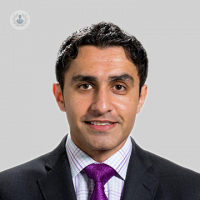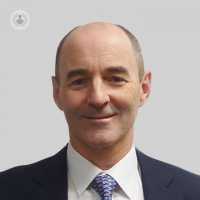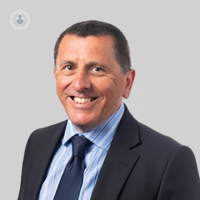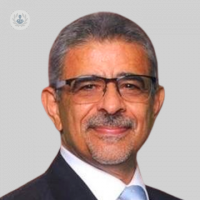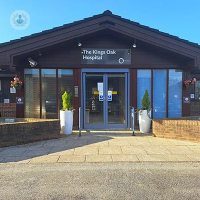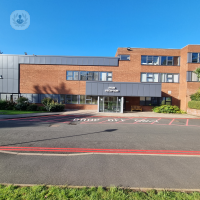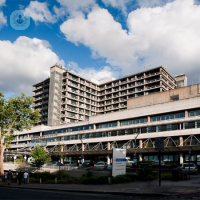What is deafness?
Deafness, also known as hearing loss, describes difficulty hearing or the total inability to hear. Deafness can be partial or complete, and can occur gradually with age or it can happen suddenly. Some people are born with deafness.
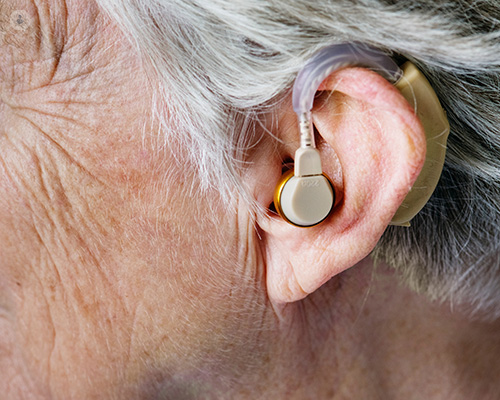
What are the symptoms of deafness?
Particularly if hearing loss is happening gradually, noticing it can be difficult. However, the following are common signs that you may be going deaf:
- Asking people to repeat themselves
- Needing to turn the television up loud
- Difficulty hearing people, especially in loud places
- Muffling of speech
- Withdrawing from taking part in conversations
What causes deafness?
The causes of deafness can be congenital or acquired.
Congenital causes present at birth or soon after birth. They can be hereditary or non-hereditary, and are due to complications during pregnancy or childbirth.
Acquired causes can occur at any age due to:
- Infection or growths (tumours)
- Chronic ear infection
- Exposure to excessive noise
- Ageing
- Build-up of earwax
- Ruptured ear drum
Can deafness be prevented?
There are certain risk factors that can damage the ear or cause deafness, so prevention can be sought by:
- Avoiding loud noises (e.g. music concerts for long periods of time, listening to music too loudly)
- Vaccinating children against measles and meningitis
- Having hearing tests for children
- Avoiding certain medications, if possible
- Taking care if your work involves loud noises and wearing ear protectors
What is the treatment for deafness?
Sometimes, hearing loss will get better on its own, for example if earwax is removed or treated with eardrops.
However, other forms of deafness can be permanent. In such cases, treatment will aim to improve what hearing you have left. This can be done with hearing aids, cochlear implants, or by teaching lip reading or sign language.
11-13-2012 10-04-2023Deafness
Mr Richard Irving - Otolaryngology / ENT
Created on: 11-13-2012
Updated on: 10-04-2023
Edited by: Carlota Pano
What is deafness?
Deafness, also known as hearing loss, describes difficulty hearing or the total inability to hear. Deafness can be partial or complete, and can occur gradually with age or it can happen suddenly. Some people are born with deafness.

What are the symptoms of deafness?
Particularly if hearing loss is happening gradually, noticing it can be difficult. However, the following are common signs that you may be going deaf:
- Asking people to repeat themselves
- Needing to turn the television up loud
- Difficulty hearing people, especially in loud places
- Muffling of speech
- Withdrawing from taking part in conversations
What causes deafness?
The causes of deafness can be congenital or acquired.
Congenital causes present at birth or soon after birth. They can be hereditary or non-hereditary, and are due to complications during pregnancy or childbirth.
Acquired causes can occur at any age due to:
- Infection or growths (tumours)
- Chronic ear infection
- Exposure to excessive noise
- Ageing
- Build-up of earwax
- Ruptured ear drum
Can deafness be prevented?
There are certain risk factors that can damage the ear or cause deafness, so prevention can be sought by:
- Avoiding loud noises (e.g. music concerts for long periods of time, listening to music too loudly)
- Vaccinating children against measles and meningitis
- Having hearing tests for children
- Avoiding certain medications, if possible
- Taking care if your work involves loud noises and wearing ear protectors
What is the treatment for deafness?
Sometimes, hearing loss will get better on its own, for example if earwax is removed or treated with eardrops.
However, other forms of deafness can be permanent. In such cases, treatment will aim to improve what hearing you have left. This can be done with hearing aids, cochlear implants, or by teaching lip reading or sign language.


Deafness: can hearing loss be reversed?
By Mr Michael Pringle
2024-12-25
Struggling to hear what people say during a conversation? Do you need to turn the TV up louder? These could be signs of hearing loss. Read more from our expert ENT surgeon Mr Michael Pringle on how to improve your hearing and how to avoid deafness. See more
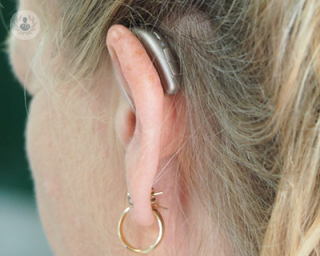

Worried about hearing loss? Your questions answered by a specialist
By Mr Guna Reddy-Kolanu
2024-12-18
Hearing loss, however slight, can affect a person's ability to socialise and work as well as their general wellbeing. Thanks to modern technological advances, however, patients suffering with hearing problems can benefit from significant improvements afforded by hearing aids, surgery or other treatment options. To discuss this, we invited leading consultant ENT surgeon Mr Guna Reddy-Kolanu, who answers commonly asked questions about hearing loss in this informative article. See more
Experts in Deafness
-
Mr Ravinder Singh Natt
Otolaryngology / ENTExpert in:
- Blocked nose
- Deafness
- Tonsillitis
- Snoring
- Hoarseness
- Dysphagia
-
Mr Richard Irving
Otolaryngology / ENTExpert in:
- Facial paralysis
- Vertigo
- Glue ear
- Deafness
- Acoustic neuroma
-
Mr Michael Pringle
Otolaryngology / ENTExpert in:
- Middle ear surgery
- Deafness
- Tinnitus
- Cholesteatoma
- Paediatric ENT
- Tonsillitis
-
Mr Craig Murray
Otolaryngology / ENTExpert in:
- Ear infection
- Hearing loss
- Audiometry
- Vertigo
- Deafness
- Glue ear
-
Mr Mahmoud Salam
Otolaryngology / ENTExpert in:
- Sinusitis
- Endoscopic sinus surgery
- Deafness
- Ear infection
- Voice disorders
- Nasal polyps
- See all

Kings Oak Hospital - part of Circle Health Group
Kings Oak Hospital - part of Circle Health Group
127 The Ridgeway, Enfield EN2 8JL
No existe teléfono en el centro.
By using the telephone number provided by TOP DOCTORS, you automatically agree to let us use your phone number for statistical and commercial purposes. For further information, read our Privacy Policy
Top Doctors

The Priory Hospital - part of Circle Health Group
The Priory Hospital - part of Circle Health Group
Priory Road, Edgbaston, Birmingham B5 7UG
No existe teléfono en el centro.
By using the telephone number provided by TOP DOCTORS, you automatically agree to let us use your phone number for statistical and commercial purposes. For further information, read our Privacy Policy
Top Doctors

The Royal Free Hospital
The Royal Free Hospital
Pond Street, Hampstead. NW3 2QG
No existe teléfono en el centro.
By using the telephone number provided by TOP DOCTORS, you automatically agree to let us use your phone number for statistical and commercial purposes. For further information, read our Privacy Policy
Top Doctors
-
Kings Oak Hospital - part of Circle Health Group
127 The Ridgeway, Enfield EN2 8JL, North LondonExpert in:
- Cancer
- Cardiology
- General Surgery
- Orthopaedic surgery
- Diagnostic Imaging
- Obstetrics and Gynaecology
-
The Priory Hospital - part of Circle Health Group
Priory Road, Edgbaston, Birmingham B5 7UG, EdgbastonExpert in:
- Cancer
- General Surgery
- Orthopaedic surgery
- Thoracic Surgery
- Obstetrics and Gynaecology
- Urology
-
The Royal Free Hospital
Pond Street, Hampstead. NW3 2QG, Central LondonExpert in:
- General Surgery
- Orthopaedic surgery
- Robotic Surgery
- Dermatology
- Obstetrics and Gynaecology
- Paediatrics
- See all
- Most viewed diseases, medical tests, and treatments
- Snoring
- Polysomnography (sleep study)
- Nystagmus
- Migraine
- Minimal access surgery (keyhole surgery)
- Head and neck cancer
- Neck lump
- Botulinum toxin (Botox™)
- Thyroid disorders
- Anti-ageing treatments

